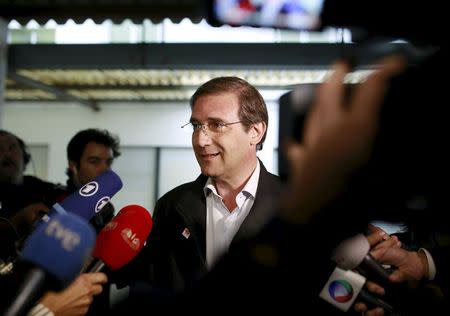Ruling Portugal coalition heads for win, may lose majority
By Axel Bugge and Andrei Khalip LISBON (Reuters) - Portugal's centre-right government headed for victory in an election on Sunday that was a vote test of its tough austerity stance, but exit polls showed it was likely to lose its majority in parliament. If Prime Minister Pedro Passos Coelho retains power, it would be the first re-election of any of the leaders across Europe that imposed hardship on voters under international bail-out packages that followed the 2009 sovereign debt crisis. Yet a minority government could unnerve investors in the Iberian country of 10 million. Not one minority administration has survived a full term in Portugal since the 1974 overthrow of the fascist regime installed by dictator Antonio Salazar. Passos Coelho's Socialist challenger Antonio Costa conceded defeat as exit polls showed that the government was projected to win between 36.4 percent and 43 percent of the vote, ahead of opposition centre-left Socialists on 29.5 to 35 percent. Partial results showed the coalition at around 39 percent of the vote. The range of projections put the highest possible number of seats the government could win at 118 in the 230-seat parliament but other tallies pointed to an amount lower than the 116 needed for an outright majority. Despite the uncertainty, the government declared victory. "In the name of the coalition we are here to affirm that all the projections that are known point to a clear fact that the coalition Portugal Forward had a great victory on this election night," Marco Antonio Costa, deputy president of the main coalition party, the Social Democrats, told cheering supporters. While it was still mathematically possible for parliament to end up with a left-wing majority if the Socialists joined up with Communists and other leftists, that option looked unlikely as Socialist leader Costa acknowledged he had lost. "I take the responsibility for this," Costa said. "The Socialist Party did not reach its objectives." Passos Coelho's coalition raised taxes while cutting public spending, but argued during the campaign that the country was now finally beginning to see the fruit of the measures with a gradual return to growth after three years of recession. The general election was the first since Portugal exited an international bailout last year. Victory for the government was unthinkable just a few months ago with polls giving a solid lead to Socialists who promised to ease back on austerity and give more disposable income back to families. It comes amid signs that voters elsewhere in Europe appear resigned to austerity. In Greece, voters gave Alexis Tsipras a new mandate last month to implement tough measures he had once rejected; and in Spain, Prime Minister Mariano Rajoy's People's Party leads polls before a Dec. 20 election. Nicholas Spiro of Spiro Sovereign Strategy said the election underlined the weakness of the Socialist Party (PS) challenge in a country where unemployment remains high at 12.4 percent and many Portuguese have felt no benefit from the fledgling recovery. "This election was a defeat for the PS more than anything else," he said. President Anibal Cavaco Silva will have the task of naming the next prime minister. But the constitution does not specify how the president picks the winner, whether by the number of votes or the number of lawmakers elected to parliament. "I'm confident in the job I've done ... the next four years will be very different from the past four," said Passos Coelho after voting on Sunday. The son of a country doctor who grew up in Angola, Passos Coelho has once acknowledged that he wanted "to go beyond the Troika", that is demands by Lisbon's bailout creditors, to swiftly reconquer investor confidence. Portugal's economy returned to timid growth last year after a three-year recession and growth is now accelerating to 1.6 percent. Going into the election, investors were broadly confident that Lisbon would pursue its reforms. Portuguese bond yields held just above seven-week lows on Friday. (Additional reporting by Sergio Goncalves and Shrikesh Laxmidas; Editing by Raissa Kasolowsky and Mark John)




